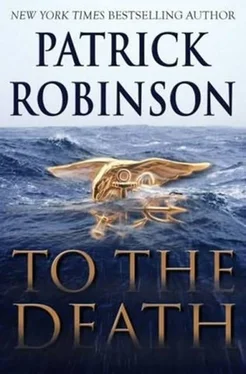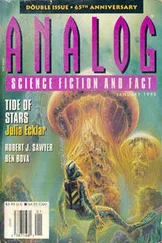“In flagrant defiance of the ATC instructions, right?” Henry was trying to close in.
“Not necessarily, sir. There may have been an electronic foul-up. Flight 62 may not have been receiving us. We were not in communication. And that would make it an accident, sir. Not defiance.”
Henry persisted. “Okay, let me rephrase. For how long were you able to track the aircraft after you first noticed it was not obeying instructions?”
“I would say less than an hour, sir. We had it on radar, fifty miles offshore, east of Norfolk, Virginia.”
“And then it vanished?”
“Yes, sir.”
“Do you have a record of the height the aircraft was flying when it disappeared?”
“I am certain we do.”
“Could I see that record?”
“I am sorry, but everything’s gone to the government department that investigates such matters.”
“Would anyone remember whether Flight 62 was at thirty thousand feet or two thousand feet when it vanished?”
“Possibly, but that information would be classified right now until the documents are released by the government and a satisfactory explanation has been found.”
“Okay, I’m just trying to establish whether that aircraft, packed with civilian passengers, who are now dead, disappeared from your screens way up there in the stratosphere, either because of a bomb or some other explosion. Or perhaps it just suffered what you guys call catastrophic mechanical failure and plunged into the ocean?”
“I’m sure one day, sir, this will all come to light. But right now that is not possible.”
Henry Brady tried to pull rank. “I represent the most powerful political newspaper in the United States,” he said. “And in my opinion, the citizens of this country have a right to know what happened if Americans died in any kind of disaster.”
“Sir, there were no Americans on board. The aircraft was Canadian-based, Canadian-owned. It was not scheduled to stop in the USA.”
“How do you know this, if you were not in communication?”
“Sir, every flight has a number which betrays its origins. This was TBA 62. We have of course been in contact with its parent corporation.”
“That’s Thunder Bay Airways, right?”
“Correct. And they may be able to help you more than we can.”
That last sentence had Henry on the line in double-quick time to the little airline on the freezing north shore of Lake Superior. And there he discovered the aircraft was very lightly loaded, it had made a fuel stop in Palm Beach, unscheduled, and there were no Americans on board.
The chief executive confirmed the flight had been lost, out in the Atlantic, according to the Americans. So far as the airline was concerned, no one had any idea where the wreckage was, not within an area of 2,500 square miles. So far as they were concerned, no further search-and-rescue operations were being conducted.
Yes, they could confirm that the senior directors of the airline were of Arabian descent, and yes, the majority shareholders were extremely wealthy Saudis. That was public record.
Henry at that stage had a smattering of facts. And a very big mystery. So far as he was concerned, that was perfect. So long as he could ascertain that Admiral Morgan was right in the middle of it.
And that would take several leaps of faith, all of them slightly shaky. But Henry was a newspaperman, and his business was not to establish the pure unbridled truth. He worked for a commercial corporation. His business was to sell newspapers, to write a slightly sneering, cynical story against the government, not to establish unbridled truth. Henry was quite prepared to take those leaps of faith.
And he was prepared to take a really big one on the subject of TBA’s Flight 62.
This is what he wrote: “So what was the true fate of that innocent passenger jet, flying through peaceful American skies, lawfully taking its people home? Was it really subject to ‘catastrophic mechanical failure’? Or did something more darkly sinister befall it?
“As a reporter of more than 20 years’ standing, I am acutely aware of evasiveness; I am tuned to understand when people do not want to answer my perfectly reasonable questions, on behalf of my readers.
“And in this case they most certainly were reluctant to tell me anything, save for the obvious, that the aircraft disappeared off the screens. We do not know why, and since its communications with the tower were down, we do not know precisely where, although it was out over the deep Atlantic.”
Henry could really go no further. But this feature story was designed to be about Admiral Morgan, and Henry was obliged to end it with a bit of a flourish. This he managed to do:
“Perhaps, then, I should offer this: Could the aircraft have been subject to a planted bomb? Or was it in any way possible that this Arab-owned Boeing 737 was somehow connected to the gang that tried to bomb Logan International?
“And might it have been cold-bloodedly shot down by American military fighters, on the specific orders of the President of the United States, on the advice of his permanent right-hand man, Admiral Arnold Morgan? There are those close to the president who believe this is the real truth.”
Henry Brady realized this ending was based on the flimsiest of suppositions, but he remembered Anthony Hyman’s words, that this suspicion had been raised by a very senior man in the White House.
Like many another journalist, Henry had decided to take his chances. If there was a stern White House denial, so what? It all added to the controversy. If nothing was said, then that made his conclusions look even better.
What Henry did not know was that his story about Admiral Arnold Morgan would have massive ramifications. And that they would begin in an underground room at the back end of Gaza City, six thousand miles away.
General Ravi Rashood was devoted to newspapers. When he and Shakira had lived in Damascus, they had bought a selection of foreign newspapers from the most famous bookshop in the city, the Librairie Avicenne, three times a week. He rarely missed purchasing irregularly available copies of the New York Times, Wall Street Journal, Washington Post, and London Daily Telegraph.
Here in Gaza it was more difficult. Foreign papers arrived only sporadically, and often the Hamas field agents were slow to grasp important items. However, no one missed Henry Brady’s story in the Washington Post, and three copies of it arrived from different sources, in the mail, at the house off Omar el-Mukhtar Street on Monday morning, March 5.
Ravi sat outside in the courtyard, sipping coffee and contemplating the significance of the strange and powerful man who sat effortlessly at the right hand of the President of the United States.
He knew precisely who the admiral was, and had indeed given serious thought to assassinating him in London six years previously. But it had proved impossible. The admiral’s security staff, when traveling, rivaled that of the president himself.
At least it did when he was on official business, as Ravi had assumed he had been, that summer in London.
Shakira brought him some more coffee and asked him what he was reading. “Oh, nothing much,” replied her husband. “Just some newspaper articles about an American admiral.”
“Well, if it’s not important, why do you have three copies of it?”
“How do you know I have three copies of it?”
“Mostly because I am able to count,” said Shakira sassily. “One in your hand, one sticking out of this envelope, and one on the floor.”
“I don’t think that makes them important,” said Ravi.
“Someone did,” she said. “Three people did. Otherwise why did they send them to you?”
“They actually sent them to Colonel Abdullah, who used to live here.”
Читать дальше












